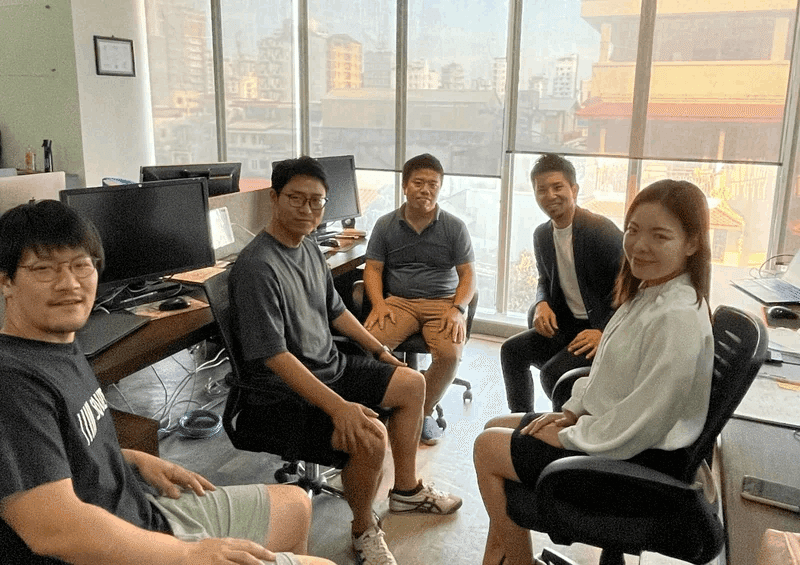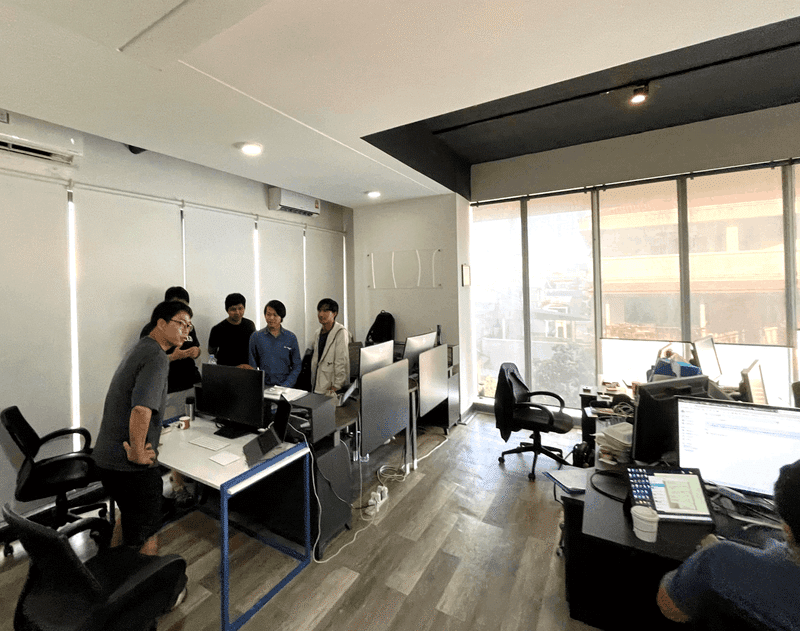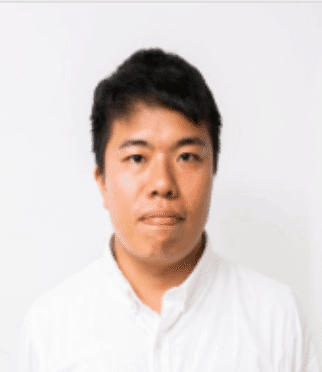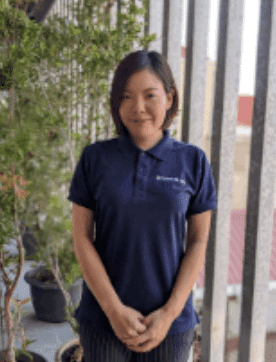
Value and Experience beyond Cambodia and Japan
We will focus on SQUEEZE Asia, which conducts operations in Cambodia this time. The following is a round-table discussion with Shinichi Tatebayashi (Representative Director), Hiroki Sekine, Masataka Arai from SQUEEZE inc., and Izumi Yamaguchi and Misato Harada from SQUEEZE Asia.

■ The growth potential and possibilities in Cambodia
── Tell us how SQUEEZE came to have a base of operations in Cambodia.
Tatebayashi: There are two main reasons why we chose Cambodia as our overseas base. The first is language. Cambodia has an abundance of multilingual human resources that can handle both English and Chinese. Multilingual support is essential for Japan to increase the number of inbound visitors as a tourism-oriented country. We want to keep expanding into English, Chinese, Thai, and Korean. Looking at that market, Cambodia was very attractive. The other thing is the economy. Cambodia has one of the most remarkably developed economies in Southeast Asia, and prices are stable on a dollar basis. The IT infrastructure is also stable. In addition, the fact that Yamaguchi, who currently serves as director of SQUEEZE Asia, was already doing business in Cambodia was also a major reason.
In 2019, we established SQUEEZE ASIA CO., LTD. to develop our cloud concierge business, which now operates with approximately 20 people, including staff working remotely from the US. Cambodia is an important base for us.

── Please introduce yourselves and tell us what kind of work you do.
Yamaguchi: I was originally involved in microfinance and agriculture-related businesses in Cambodia. I met Tatebayashi through an acquaintance, and we hit it off in a mutual interest in becoming a bridge between Japan and Cambodia in the tourism field, which led me to join SQUEEZE. I am currently working as a director of SQUEEZE Asia.

Sekine: In my case, I was introduced to the company by an engineer acquaintance. At the time, SQUEEZE was a young startup that had only been in business for about a year. I wanted to do work that would connect Japan to the world and local regions to the world, and I decided to join SQUEEZE because I shared its mission of "creating a society filled with value."
Roles such as system development, organization development, and collaboration with the business are always changing, but I am basically thinking about collaboration with the business from the tech side perspective. SQUEEZE Asia has established a new development organization starting at the end of 2021. Currently, four people are working on development, and we plan to increase the number of staff to five or six by the end of 2022.
Arai: In my previous job, I was involved in the digital marketing industry, but I felt stuck in a world where everything was completed digitally. Through my job search, I was attracted to the fact that SQUEEZE is globally oriented and creates jobs in Japan and overseas, and I can see the faces of guests, hotel staff, and other users of the products and feel the real value of what we create. Therefore, I joined the company in April 2016.
I started as an engineer doing development, but gradually moved into the business side, and now I am in charge of the product as a CPO (Chief Product Officer).

Harada: I was working in Siem Reap which is a tourist area in northwestern Cambodia where Angkor Wat is located, but I lost my job due to the COVID-19 and was worried about returning to my home country. At that time, I found a job offer and joined the company in January 2021. Currently, I am in charge of operations at SQUEEZE Asia and managing Cambodian staff. I originally had a job where I stood onsite and dealt with customers, so I was anxious about online customer service work, but I am finding it very rewarding as a new style that meets the needs of the times.
Tatebayashi: Harada previously worked in face-to-face hospitality in Siem Reap. Now he is setting it up how he can provide hospitality as a concierge online. I think it is safe to say that he is truly a digitally transformed person.
With these members, I work daily to check in and check out guests, provide concierge during their stay, and improve operations based on word of mouth.
■ Features and Strengths of Cloud Management Solutions from a Party's Perspective
── SQUEEZE is deploying a cloud management solution in which a cloud team operates and manages common hotel operations such as reservations and guest relations. What is the significance of deploying this solution in Cambodia?
Arai: In conventional operations, employment and management costs are incurred each time a new hotel is launched. In addition, the hotel industry has a high turnover rate, so attracting human resources is a major challenge. However, by choosing the "cloud management" solution, we can access human resources from all over the world. Not only is this an advantage in terms of securing human resources, but it is also an advantage in terms of multilingual support. Especially with the focus on the advantages of non-contact due to COVID-19, we have been able to break the stereotype that "it's a hotel, so it can only be done by people on-site" and help many people understand that hospitality can be done properly online as well.
Yamaguchi: It is a very difficult challenge in the sense that we have to satisfy the other party without meeting the customer directly. For example, we have to determine what customers want and what they are having trouble with and respond to them through non-face-to-face communication such as phone calls and emails. A small team is in charge of concierge services for more than a dozen hotels nationwide, and one staff member handles dozens of calls and e-mails a day. Because the number of cases handled is significantly higher than that of a regular front desk, a great deal of knowledge is accumulated and the level of customer service is dramatically improved.
Harada: Although there are difficulties in performing concierge operations remotely, such as not having the experience of visiting the site, there is instead much know-how in remote customer service. We collect detailed information on facilities in advance and compile it in a dashboard. Also, we use a 360-degree camera to make it possible to check facilities as if we were on-site and improve operations by adding information on facilities obtained through inquiries to manuals so that anyone can provide the same quality of service. It is rewarding when we can respond to inquiries successfully, and that is our value.

── There are some strengths from a technology perspective, right?
Sekine:The strength of our cloud operations solution is that we can combine operations and technology to constantly improve. For example, a typical hotel rarely changes its check-in process, but we frequently improve the check-in process, including the ease of use of our tools, so it can be completely different than it was six months ago. This is not only in terms of operational efficiency, but also in improving the customer experience.
We are able to make such improvements because we develop our own systems. We use a dogfooding style, in which the developed system is improved through repeated trial and error at the hotels we operate. The ability to continuously update the system while verifying operations is a major advantage.
Arai: In a traditional hotel, while performing front desk duties, the receptionist also handles phone calls, which tends to shred concentration and reduce productivity. By moving reception operations to the cloud and concentrating on tasks that can only be done by being onsite, quality and productivity will improve. From the guest's perspective, there is also the benefit of not having to wait in line at the front desk when checking in and out. We would like to pack more value into the time of both hotel operators and guests.

■ The qualities we look for in our engineers
── From your perspective, what do you want from your tech team and engineers?
Harada: It is the coordination between operations and systems in the Cambodian team. Currently, we have engineering teams in Japan and Cambodia, but since the function of cloud reception is utilized in Cambodia, it would be great if the engineer sitting next to the operators could lead the development of that part of the system. It would be great if system improvements could be realized through discussions between the operators in Cambodia and the tech team.
Sekine: The development of cloud reception operations by Cambodian members is a team goal for the next phase of the project. In the future, we are considering having Cambodian engineers come to Japan to gain experience in actual hotel operations and deepen their understanding of the system. Ideally, they would work in Japan and bring the knowledge they gained back to Cambodia to share with the team. SQUEEZE would like to create opportunities for both Japanese and Cambodian members to be stimulated by new experiences and challenges.
── Are you hiring local engineers in Cambodia or Japanese who want to go overseas from Japan?
Tatebayashi: Both. There is room for improvement in various scenes, such as cleaning, linen management, check-in lines, CRM, etc. Currently, this is an area of development for the Japan team, but there are opportunities for the Cambodia team to develop as well. As far as I know, there are not many companies in the hotel industry who are developing globally. I think there will be interesting discoveries if people who are excited about the parts that can be developed globally become members of the team.
Sekine: It is very important for engineers to understand the actual operational scene. It is necessary to have a firm grasp of operations, find appropriate points for improvement, and implement them. We want people who are always aware of problems, who can find points for improvement, and who are interested in making things better.

■ Pursuing the value that only online can provide
─── What is SQUEEZE's vision for the future?
Arai: In the short term, we would like to strengthen cooperation between Cambodia and Japan. We would like to increase opportunities for engineers to come from Cambodia to Japan and from Japan to Cambodia to develop together. Not only will this increase the resolution of operations, but it will also create the possibility of various ways of working.
In the long term, our goal is to accumulate and analyze voice data to provide new value for our customers. In addition to this, we are also focusing on developing the possibilities of hospitality that are possible only online, such as the use of avatars and new ways of delivering voice and video.
Sekine: We want to improve "suitebook," the core system for hotel operations, to create a system that allows on-site crews to work more efficiently. For example, the system automatically notifies guests of the tasks they need to do today, and suggests room upgrades such as "This guest is a repeat guest, so we recommend upgrading their room." In addition, although "suitebook" is currently specialized for hotel management operations, we are also looking to horizontally expand the system beyond hotel operations in the future.
Yamaguchi: Although we are currently operating an apartment-type hotel "Minn" in Japan, we also have a plan to operate a hotel in Cambodia too in the future. The aim is not only for guests, but also to enable local staff to work at the facility before they leave for Japan so that they can work immediately when they arrive in Japan. We are considering operating a small-scale hotel of 5 to 10 rooms as an office and hotel while conducting demonstration experiments.
Tatebayashi: SQUEEZE is in a very unique position in the hotel industry. One axis is "Technology x Operations," and the other is "Global." As for our uniqueness, I think there are many interesting opportunities for those who are interested in these two axes.


― In conclusion…
SQUEEZE has various new management projects in the pipeline, including a hotel with more than 100 rooms and a hotel in a ballpark, and we are looking for new employees to join us!
In addition, SQUEEZE Asia plans to increase the number of development organizations that launched in 2021!
If you want to create new value in the lodging industry by proposing solutions from both system and operational perspectives, and if you want to be involved in global system development, we are looking forward to working with you!
If you're at all interested, please feel free to come talk to us!
― Member Profile

Representative Director / CEO Shinichi Tatebayashi
After graduating from Tokai University with a degree in Political Science and Economics, he worked at Goldman Sachs Group, Inc. (Singapore branch office). After that, he was in charge of display advertising management at the Singapore branch of TripAdvisor, Inc. In September 2014, he founded SQUEEZE Inc. and became CEO.

Director / CTO Hiroki Sekine
Experienced in new service development and management at several startups and venture companies. In October 2015, he became CTO of SQUEEZE Inc. As community activities, vice-chair of PyCon JP 2015 and organizer of "Python Mokumoku Kai".
He is co-author of ”Python Engineer Training Readers” (2015 Gijutsu Hyoron Co., Ltd.) and ”Python Engineer First Book” (2017 Gijutsu Hyoron Co., Ltd.).

CPO(Chief Product Officer) Masataka Arai
After graduating from the University of Tokyo's Faculty of Letters, he joined Allied Architects, Inc. in April 2013 where he was engaged in product development to support corporate marketing using SNS. In April 2016, he joined SQUEEZE Inc. as an engineer and has been in charge of product manager since 2020 and CPO since April 2022.

SQUEEZE Asia Director Izumi Yamaguchi
After graduating from Hitotsubashi University, Faculty of Commerce, he worked for a consulting firm before moving to Cambodia to start his own business. He developed agriculture-related businesses. In 2019, he participated in the launch of SQUEEZE ASIA and was appointed as a director.

SQUEEZE Asia Misato Harada
From 2012-2016, she worked as a Japanese Guest Relations at a hotel in Siem Reap, the city of Angkor ruins. From 2017-2020, she worked as a souvenir store manager for a spa and natural cosmetics using Cambodian herbs in Siem Reap. Since January 2021, she has been in charge of SQUEEZE Asia's Cloud Concierge.

